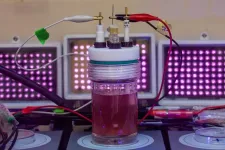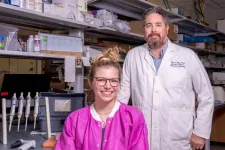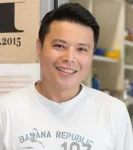(Press-News.org) Many of us feel that we, or our children, spend too much time staring at a screen. From gaming to social media use or ‘doomscrolling,’ it can sometimes feel that we are mindlessly spending hours going down a rabbit hole of technology.
However, according to Catherine Knibbs, a psychotherapist who specializes in cybertrauma and online harms, there are tangible steps we can all take to wrestle back control from the hands of the technology corporations.
In her new book, Managing Your Gaming and Social Media Habits: From Science to Solutions, part of the new Ask The Experts in Psychology series in partnership with the British Psychological Society, Knibbs argues that technology itself is neither good or bad. Rather, it depends on how it is used, and who it is used by.
“For some people social media and gaming offers a lifesaving space,” says Knibbs. “Games provide a space for people to connect, and to combat other feelings that exist in their lives such as loneliness, anxiety, depression.”
For example Knibbs points to the role that technology played in allowing us to connect with others during the COVID pandemic, when we couldn’t socialize physically.
“Cyberspace connections result in people being connected, and young people and adults tell me that the communities they are part of online help them feel like they are with people who understand them, see them and have the same interests. This can help them when they feel alone and in need of support.”
However problems can arise if a person spends so much time engaging with technology that they stop paying attention to full bladder signs, or no longer want to participate in the real world, Knibbs explains. Eventually it can lead to a situation where children skip school, or adults don’t go to work.
The key, she suggests, is to manage our technology use so that we can reap the rewards without falling prey to the negative sides of screen use. According to Knibbs, the first step in this process is to understand the tricks that technology companies use to get you addicted to their apps and devices in the first place.
“Technology companies create products that deliberately tap into our inner most desires and needs so as to keep our attention on those products,” says Knibbs.
These innate needs include our desire to be recognized, seen, valued, loved and needed, Knibbs explains. For example video games offer users visibility of experience points (XP), prestige status and trophies, skins and other visible attributes that show how ‘good’ a player is.
There is also our fear of missing out: “We are born ready to socialize and in doing so we have a primary need to get others to take care of us to prevent us from being rejected, abandoned, and causing us to die,” says Knibbs.
“That avoidance of rejection and abandonment underpins most of what you do daily. Especially on social media.”
Technology also taps into our desire for novelty, excitement and reward, Knibbs explains. To grab our attention and keep it, apps send out a constant stream of prompts, pings and pushes, nudges, and rewards.
So what can we do about this? Knibbs recommends starting with writing a diary of technology use and thinking critically about the situations in which you use it, and what needs you are trying to meet when you reach for your smartphone.
“You might notice what you did, where you were and what time it was when you first noticed the urge to open the phone, laptop, computer, console etc for the first time on this day of the week,” says Knibbs.
The aim is to recognize when your use of technology is helpful and purposeful, and when it is not, Knibbs explains, and to try to engage with social media in a more mindful and purposeful way so that users feel more in control. She encourages people to try to notice the kinds of things they seek out online, engage with, scroll past, or hover on when in the spaces of social media.
Other tips include turning the background colours to black and white, removing notifications from the app or home screen, or installing time blockers to tell users when they have spent a certain amount of time online.
“When we engage with social media or gaming we disconnect from our bodies and being present, and spend that time interacting with the media for what can seem like hours,” says Knibbs.
“This is one of the reasons why we get ‘caught up’ in the scrolling. Being able to avoid these traps requires us to become skilled at noticing. Mindful meditation practices can help, and with continuous practice you should be able to switch to a state where you can engage with technology more intentionally, when you have the capacity to do so.”
END
How to control your screentime use and make technology work for you
2024-08-26
ELSE PRESS RELEASES FROM THIS DATE:
Matching dinosaur footprints found on opposite sides of the Atlantic Ocean
2024-08-25
DALLAS (SMU) – An international team of researchers led by SMU paleontologist Louis L. Jacobs has found matching sets of Early Cretaceous dinosaur footprints on what are now two different continents.
More than 260 footprints were discovered in Brazil and in Cameroon, showing where land-dwelling dinosaurs were last able to freely cross between South America and Africa millions of years ago before the two continents split apart.
“We determined that in terms of age, these footprints were similar,” Jacobs said. “In their geological and plate ...
Turning bacteria into bioplastic factories
2024-08-23
In a world overrun by petroleum-based plastics, scientists are searching for alternatives that are more sustainable, more biodegradable and far less toxic to the environment.
Two new studies by biologists at Washington University in St. Louis highlight one potential source of game-changing materials: purple bacteria that, with a little encouragement, can act like microscopic factories for bioplastics.
A study led by graduate student Eric Conners found that two relatively obscure species of purple bacteria have the ability to produce polyhydroxyalkanoates (PHAs), natural ...
Researcher finds sound progress in babies’ speech development
2024-08-23
The sounds babies make in their first year of life may be less random than previously believed, according to a language development researcher from The University of Texas at Dallas.
Dr. Pumpki Lei Su, an assistant professor of speech, language, and hearing in the School of Behavioral and Brain Sciences, is co-lead author on two recent articles in which researchers examined the sounds babies make. The results suggest that children in their first year are more active than previously thought in their acquisition of speech.
“We observed in these studies that infant vocalizations are not produced randomly; they form a pattern, producing three categories of sounds in clusters,” ...
Two epicenters led to Japan’s violent Noto earthquake on New Year's Day
2024-08-23
Key takeaways
The 7.5- magnitude earthquake beneath Japan’s Noto Peninsula on Jan. 1, 2024, occurred when a “dual-initiation mechanism” applied enough energy from two different locations to break through a fault barrier – an area that locks two sides of a fault in place and absorbs the energy of fault movement, slowing it down or stopping it altogether.
An international team of researchers led by UCLA graduate student Liuwei Xu, professor Lingsen Meng and UC Santa Barbara’s Chen Ji analyzed a preceding seismic swarm and identified a previously unknown barrier in the region of the swarm.
The team’s data collection methods could ...
A leaky sink: Carbon emissions from forest soil will likely grow with rising temperatures
2024-08-23
Photos
The soils of northern forests are key reservoirs that help keep the carbon dioxide that trees inhale and use for photosynthesis from making it back into the atmosphere.
But a unique experiment led by Peter Reich of the University of Michigan is showing that, on a warming planet, more carbon is escaping the soil than is being added by plants.
"This is not good news because it suggests that, as the world warms, soils are going to give back some of their carbon to the atmosphere," said Reich, director of the Institute for Global Change ...
Rice bioengineers develop lotus leaf-inspired system to advance study of cancer cell clusters
2024-08-23
HOUSTON – (Aug. 23, 2024) – The lotus leaf is a pioneer of self-cleaning, water-repellant engineering. Water droplets all but hover on its surface, whose unique texture traps air in its nanosized ridges and folds.
Rice University bioengineers report harnessing the lotus effect to develop a system for culturing cancer cell clusters that can shed light on hard-to-study tumor properties. The new zinc oxide-based culturing surface mimics the lotus leaf surface structure, providing a highly tunable platform for the high-throughput generation of three-dimensional nanoscale tumor models.
The superhydrophobic array device (SHArD) designed by Rice bioengineer Michael King and ...
To mask or not to mask: That is still the question
2024-08-23
CHICAGO --- Despite the association between mask mandates/mask wearing and reduced death rates during the pandemic, masking remains controversial and highly politicized, with many people still asking, “do masks work, and should they be recommended?”
In an editorial about the use of surgical face masks in public, published today, Aug. 23, in The BMJ, Northwestern Medicine internal medicine experts Drs. Jeffrey Linder and Rachel Amdur make the case for masking but acknowledge it’s not a cut-and-dried topic.
The ...
A switch for immune memory and anti-tumor immunity
2024-08-23
AUGUST 23, 2024, NEW YORK – A Ludwig Cancer Research study has identified a metabolic switch in the immune system’s T cells that is essential to the generation of memory T cells—which confer lasting immunity to previously encountered pathogens—and a T cell subtype found in tumors that drives anti-tumor responses during immunotherapy.
Led by Ludwig Lausanne’s Ping-Chih Ho and Alessio Bevilacqua and published in the current issue of Science Immunology, the study identifies PPARβ/δ, a master regulator of gene expression, as that essential molecular switch. Ho, Bevilacqua and their colleagues also show that the switch’s dysfunction compromises ...
Study finds nearly half of U.S. counties have at least one ‘pharmacy desert’
2024-08-23
COLUMBUS, Ohio – Nearly half of counties in the United States have at least one ‘pharmacy desert’ where there is no retail pharmacy within 10 miles, according to a new study published by researchers at The Ohio State University Comprehensive Cancer Center – Arthur G. James Cancer Hospital and Richard J. Solove Research Institute (OSUCCC – James).
“As pharmacies close, more and more Americans are left without easy access to medications, with disproportionate consequences on certain communities. We found that patients in counties with higher social vulnerabilities and fewer primary care providers were up to 40% more likely to reside in a region ...
MSU study finds placebos reduce stress, anxiety, depression — even when people know they are placebos
2024-08-23
MSU has a satellite uplink/LTN TV studio and Comrex line for radio interviews upon request.
EAST LANSING, Mich. – A study out of Michigan State University found that nondeceptive placebos, or placebos given with people fully knowing they are placebos, effectively manage stress — even when the placebos are administered remotely.
Researchers recruited participants experiencing prolonged stress from the COVID-19 pandemic for a two-week randomized controlled trial. Half of the ...




